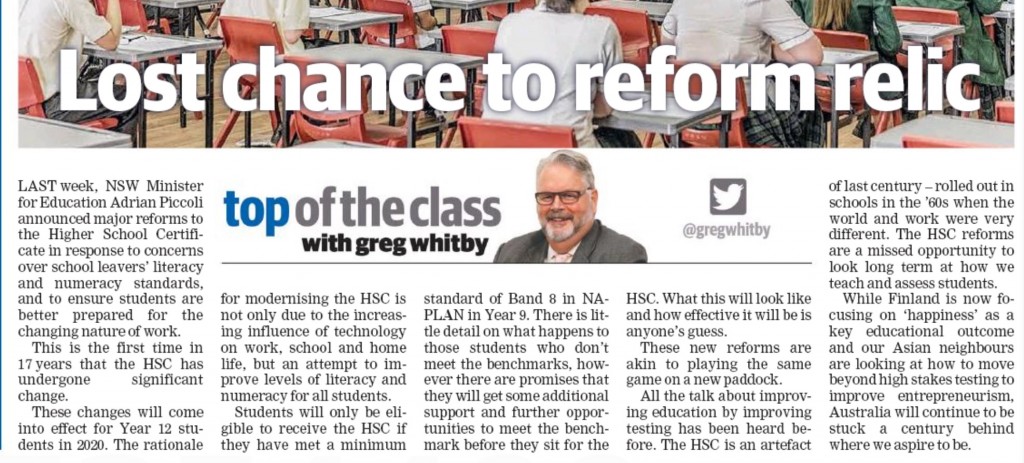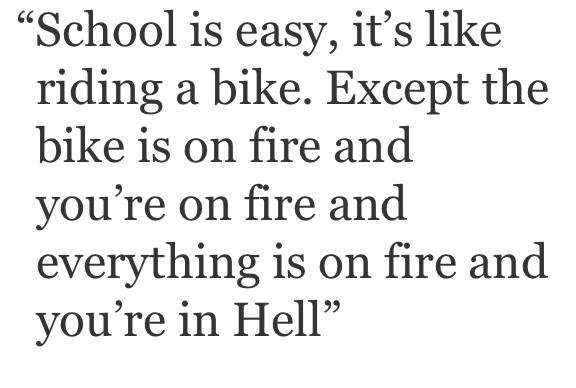In lockdown last year I started my 7th university qualification, after all, there’s only so much bread you can bake. (Full disclosure, I didn’t actually bake any bread). I’ve continued my study this year, and my current subject is Analyse: Evaluation and Assessment in Learning Design. It has brought to the surface, yet again, something that has bothered me for a long time, what we teach and how we assess our senior high school students in NSW. I was blogging a lot about this before the blog was hijacked by Covid. My personal self-imposed mission is to help students cope with the academic demands of school, in a system that I think is outdated and places unnecessary stress on them. Even more so this year with the uncertainty around the HSC examinations (we are still waiting for the new timetable to drop.)
But what is the purpose of Year 11 and 12? One could argue that Years 7-10 is about grounding students in a comprehensive general knowledge and understanding of the basics of things like mathematics, literature, history, geography, science, music, the arts and so on. I am on board with this. We want to make sure we grow a generation of students who know a bit about the world they live in and have developed skills of critical thinking and analysis.
However, that argument doesn’t hold in the senior years as otherwise all subjects would be compulsory. If I want to be a scientist, why I am made to also choose at least 3 other unrelated subjects that I have interest in learning in-depth. This is one of the reasons students get frustrated. “Why am I learning this? I am never going to use this in my life.”
Students who choose not to go to university and study a non-ATAR pathway have much better options these days. They can study VET subjects and subjects more relevant to their future life. Sadly there still remains some stigma around this pathway, yet the reality is not everyone wants to attend University and that is a perfectly valid path.
For those students looking at a potential university pathway, there currently are limited options for more relevant or life skills subjects.
As an ex-teacher, it always bothered me in staff meetings when people complained, but didn’t put forward a solution. I’d love to say throw out the whole system and re-design it from scratch, but I am a realist. That is never going to happen sadly. So here is my proposal to modify our existing system to make it more relevant and palatable for more students.
Step 1: Create a new suite of academic subjects that can be counted for the ATAR, but that offer skills or learnings that students may find relevant and useful for life after school. I am talking about subjects like Psychology, Financial Skills & Investing, World Politics, Thinking Skills, Saving the Environment, Civics and Citizenship…just to name a few off the top of my head. Many of the non-ATAR subjects actually fit into this category, and could be beefed up to make them a more academic version of the subject that could then be counted towards the ATAR. So many of the current subjects do not have real world applications. The biggest complaint I hear from senior students is this is such a waste of time why do I need to know this I will never use this in my life. We need to give them at least some options where we can justify why it might be useful for later on. Yes there are still students that won’t be happy, but let’s get to that going then we can see what we need to do to address the needs of this then much smaller group.
Step 2: Year 11 is asked to look at the traditional range of subjects available and choose subjects that they think will be useful for their future career or university course, or are something they are interested in. They might plan to be a marine biologist, but they also have a passion for Modern History or Visual Arts. Great, go for it.
(As a corollary to this, I’d like to see a lot more time and money invested in careers education for students in Year 10. Some schools do a great job, in others it is tokenistic, but overall there is not nearly enough funding or allocation of lessons for students in Year 10 to really help them explore different careers or courses they might find interesting.)
Step 3: If there are not 6 subjects they are keen on, then for Term 1 Year 11 students still need to fill up the rest of their subject options from the traditional courses. This is to ensure that they don’t later say, oh I should have also studied Economics. Also good for students who still have no idea what they want to do when school finishes. So to start with, Year 11 would be just like it currently is, and a chance to try before they buy.
(A conversation with another educator who asked why do we need this step prompted me to add this: Many of the ‘traditional’ subjects would kick up a hell of a fuss if other more relevant and appealing subjects were offered. Plus people argue ‘oh but they need to give these traditional subjects a go as they might find they actually enjoy them’. I don’t agree with either of these viewpoints, and I’d be happy to skip this, but to pacify the naysayers I thought well let them choose from traditional subjects first, give them a go for a term, then they can drop the subjects they don’t find appealing and move on. Now I think more about it, the way to go would be to introduce just two new relevant subjects each year for a period of 5 years. Change by stealth. If there were another 10 subjects available that were more relevant, interesting and appealing to senior students, I think that would stem much of their dissatisfaction and frustration with the senior years.)
Step 4: At the end of Term 1, having had a good taste of their subjects, Year 11 students decide which ones they will keep, and which ones are not relevant or interesting for them and will be replaced with one of the new Life Learning subjects. So none of those new subjects start until Term 2.
This would mean that some students would continue with their 6 traditional subjects. Some would keep say 4 of those subjects, and pick up, for example, Psychology and Financial Skills instead.
If students feel they can choose subjects that they are interested in, or will find relevant for their future life, engagement and satisfaction levels would shoot through the roof and frustration levels would markedly decrease. NESA did this for non-ATAR students, gave them a chance to study subjects that are more relevant for them. NESA now needs to do the same for the ATAR students.
When I was in the senior years there were 2 subjects I wanted to do, the other 4 I chose were the ones I hated least. How depressing. I don’t want this to continue for future students.
Just in case you aren’t clear what I want, NESA needs to develop a greater range of life relevant and contemporary subjects with enough academic rigour that they can be counted for the ATAR.
Step 5: Make the final HSC exams open book. Why oh why are we still testing memorisation skills so heavily? This just creates massive stress and undue pressure on students. I can’t remember the last time I had a test at university that was testing my memorisation skills. Time to draw a line in the sand. They have had enough memorisation practice by the end of Year 10. (Although if we took it away in the senior years it would trickle down to the junior years too over time.)
Step 6: Apparently only 30% of students still use an ATAR to get into university. So why are we even having these final high-pressured exams? Perhaps instead, the highly competitive courses have an entrance exams students sit (like the GMAT and UCAT) and we ditch summative exams altogether and move purely to formative assessment. This would be transformative as we could focus purely on the learning experiences over the senior years, expanding students’ minds, and having students achieve benchmarks and standards rather than grading to a curve.
(An educator sent this to me: I worry that if unis are allowed to sit their own exams, they will become de facto the important thing, and the HSC credential will lose something widely applicable. (I worry that we may already be there with the announcement that the ATARS this year will come out before the HSC results!). I want there to be one respected credential for kids going to uni, and those who aren’t, and those who don’t know…)
I don’t know the answer for university entrances, there has to be a better system somewhere in the world – and if it is not sorted by then that’s another thing I’ll research in retirement…
There is so much widespread dissatisfaction with the current model for Years 11/12 in NSW, but nothing seems to change. Surely there are some people in positions of power that can open these discussions?? Would love to know who they are. Maybe if you share this post I’ll find them?
(If you are interested in what sparked this rant, chapter 10 of this book: https://cetl.ppu.edu/sites/default/files/publications/-John_Biggs_and_Catherine_Tang-_Teaching_for_Quali-BookFiorg-.pdf )
If you made it to the end of this post, well done. At least it made me feel better to get this off my chest.
This is all part of a long term plan, when I ‘retire’ in 15 years or so my mission and retirement plan so I am not bored is then to push for serious reform of the education system. I’ll have time then, no pressure to earn income and nothing to lose.
PS:
An educator also sent this to me: I also wish we were having a discussion about how many subjects we think should be required for the HSC. Maybe we should have students doing 7 subjects in Year 11, and present three for the HSC…?? Or stacks of other options too?? Maybe 12 units for the HSC, which could be 6 2 unit courses, or 3 4 until courses, depending on your interests and ambitions…?
I also like this idea – it is a bit like a model of what you do in University as you progress from first year and then become more specialised. Now I think about it, why do we make them do 5-6 subjects for the HSC? That is a heavy load. Even if we kept it so Year 11 you do your 12 years and Year 12 you only do 8 units? There are many other options that could be debated.

